More than half of autistic individuals suffer from chronic sleep problems. So if your little terror dislikes bedtime, you’re not alone. The good news is, if you start today, you may be able to help your child practice good sleep habits for life.
Around 3.5 million Americans are on the autistic spectrum with one in 59 children diagnosed with Autism Spectrum Disorder (ASD). Boys are four times more at risk than girls; one in every 37 boys is diagnosed as on the spectrum compared to one in 151 girls.
Although there’s no cure yet, early detection and management have positive results. That’s why, as a parent, it’s important for you to educate yourself about Autism Spectrum Disorder, it’s early signs and what you can do about it.
According to the Diagnostic and Statistical Manual of Mental Disorders (DSM-5), a person on the Autistic spectrum shows the following major signs:
- Communication Issues: Autistic people find it difficult to hold a conversation, interact socially, or respond to non-verbal cues.
- Repetitive Behavior: They show limited patterns such as setting up objects, in the same way, every time, mimicking people or repeating idiosyncratic phrases.
- Impaired Social Skills: Autistic kids may find it difficult to interact with peers. They often prefer the company of people who are older or younger than them.
- Aggressive Behavior: People on the autistic spectrum can be highly impulsive and sometimes get aggressive or violent out of frustration. It usually happens when their needs are not being met but they’re unable to communicate it verbally.
- Abnormal Sleeping and Eating Pattern: According to researchers 70% of children with autism show atypical eating behavior. Various studies also prove that people with ASD find it difficult to fall and stay asleep.
The Link Between Autism and Sleep

Around four in five autistic children have poor sleep. Studies suggest that around 80% of children with autism suffer from various sleep problems.
These sleep disturbances affect their daytime behavior and may exacerbate ASD symptoms such as less social interaction, limited communication, and a restricted repertoire of behaviors, interests, and activities.
The University of Pennsylvania also had similar findings when conducting a study to assess the effect of poor sleep on children with autism. They noted significant behavioral issues and learning problems in kids with sleep issues. Those children also found it difficult to maintain peer relations and social skills.
Another study by Ben Simon and Walker also noted more social withdrawal and loneliness in autistic people compared to the rest of the participants.
Lack of sleep in people on the spectrum is also linked to attention deficit disorder (ADD), depression and obsessive-compulsive disorder (OCD).
Sleep problems also distress the parents and adversely affect the quality of family life. As the child grows, the sleep issues may reduce but never disappear completely. Still, their sleep quality remains less restorative than those suffering from insomnia and other sleep disorders.
What Kind of Sleep Problems Are Common in Autism
![Insomnia [Illustrated icon] Sleep Disruptions [Illustrated icon] REM Sleep Latency [Illustrated icon] Sleep Apnea [Illustrated icon]](https://www.sleepare.com/wp-content/uploads/2020/03/Autism-and-Sleep-3.jpg)
People on the autistic spectrum can suffer from a wide array of sleep difficulties. These problems include delays in getting to sleep, staying asleep, waking up frequently at night and less sleep overall. The following are some of the sleep issues common in children and adults with autism.
- Insomnia: Delayed sleep onset is one of the most common sleep problems in autistic children. It takes them 11 more minutes than neurotypical people to fall asleep. This could be because they find it difficult to wind down for sleep after daytime activities.
- Frequent Sleep Disruptions: Most people with autism wake up quite a few times throughout the night. It could be due to extra sensitivity towards noise, light or other natural sensations.
- REM Sleep Latency: REM sleep is crucial for learning and retaining memories. Children with autism spend 15% of their sleep time in the REM stage, compared to 23% for neurotypical kids.
- Sleep Apnea: Some studies show that autistic children may be more prone to sleep apnea, a condition in which you stop breathing while asleep, several times during the night.
Sleep apnea restricts oxygen reaching the brain repeatedly. It can delay brain development and worsen behavioral symptoms like irritability and excitability in people with autism.
Causes of Sleep Issues with Autism
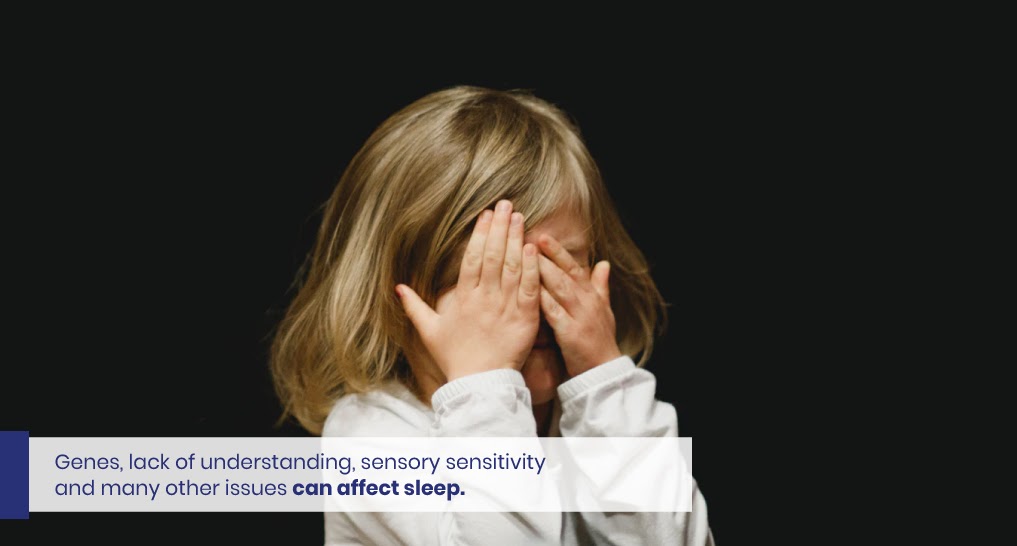
Around 38%-80% of autistic people suffer from sleeplessness but the actual cause of these problems is not clear. Although sleep and autism are interlinked, it doesn't mean one causes the other.
Nevertheless, there are several theories about the many causes of sleep issues among people on the autistic spectrum.
- Genes: A genetic mutation among autistic people makes it difficult for them to fall asleep, stay asleep and experience a restorative snooze. Sleep disorders in autistic children can be linked to a mutation in the SHANK3 gene, which regulates our 24-hour biological clock.
- Lack of Understanding: People on the spectrum are often unable to comprehend social cues such as reading and distinguishing tone of voice, body language or facial expressions. Brain activity is different among autistic people which can make them unable to realize it’s bedtime and so their body and mind aren’t prepared for sleep.
- Sensory Sensitivity: Most autistic children are hypersensitive to sensory inputs. They can’t easily block out noises, light and other sensations which may not be bothersome for neurotypical kids, but are to them. A slight disturbance such as a light touch or a whisper can make your autistic child wake up abruptly.
- Lack of Melatonin: The brain releases a hormone called melatonin that regulates the sleep cycle. High levels of melatonin at night can help keep you asleep but in autism, these levels are higher during the day and lower at night.
- Psychological Disorders: Anxiety and depression is often associated with autism as many on the spectrum are aware of their situation and try to fight it. Similarly, around 40% of autistic children also exhibit ADHD which causes hyperactivity around bedtime.
- Other Medical Problems: Many people with ASD also suffer from sleep disorders such as sleep apnea, acid reflux, constipation, diarrhea, seizures, epilepsy or OCD. These disorders can greatly affect sleep patterns and result in poor sleep.
- Side Effects of Medication: Medications for autism can cause certain side effects which may interfere with the sleep cycle. For instance, SSRIs (serotonin reuptake inhibitors) can cause irritability and mood elevation before sleep. Certain antipsychotic medications may cause daytime drowsiness, causing sleep onset delay at night.
Treatments Available for Autism and Sleep
![Melatonin Supplements [Illustrated icon] Cognitive-Behavioral Therapy [Illustrated icon] Light Therapy [Illustrated icon] Relaxation Techniques [Illustrated icon]](https://www.sleepare.com/wp-content/uploads/2020/03/Autism-and-Sleep-5.jpg)
If your child with autism has difficulty falling asleep, you should consult your pediatrician. They can refer you to an expert who will have the right treatments at their fingertips. To give you an idea, here are the treatment options usually advised for sleep problems in autistic people.
Drug Therapies

People suffering from ASD take prescription drugs such as clonidine, risperidone and donepezil to manage sleep disorders. Other types of drugs include melatonin supplements, antipsychotics, antidepressants and alpha-agnostics
Melatonin is one of the most effective drugs for treating insomnia in children with autism. It is also preferable due to its minimal side effects. The dosage starts at 0.3-0.5 mg and increases according to the child’s response to melatonin.
A 12-week study tested the effect of melatonin on 146 children with neurodevelopmental disorders. Two groups were made; one group took 0.5 mg of immediate-release melatonin 45 minutes prior to bedtime while the other group was given a placebo.
The kids who received melatonin slept faster and woke up earlier. Also, melatonin was most effective in kids who had the longest sleep latency.
SSRIs are the least effective and less tolerated among autistic children. Antipsychotic drugs are used for treating irritability while D-cycloserine is helpful against social skills impairment. However, much research is still required, so always consult your doctor before attempting to medicate your child.
Cognitive Behavior Therapy

For a comprehensive approach to improved sleep, behavioral intervention is one of the most effective, long-term treatment plans.
Before giving you a treatment plan, sleep experts conduct an informal assessment to identify the types of sleep problems and any contributing factors. They take account of your child’s bedtime routine and any inadvertent reinforcements such as giving snacks or electronics to control bedtime tantrums.
Parents of children with ASD can get counseling to prepare them for behavioral treatment. Keeping consistent routines and bedtime schedules are of utmost importance and require excessive parental participation.
The goal is to improve the child's ability to sleep independently and move to their own bedroom eventually.
Complementary Therapies

You can use many different techniques along with your medications to make bedtime as smooth as possible for your child and yourself. These therapies have no side effects and can be used safely along other autism treatments.
- Light Therapy: A special, bright lightbox is placed in front of the child for a long duration of time. The light therapy helps children with ASD wake up on time or stay awake during the day. The way it works is that it rearranges the neuronal networks responsible for complex symptoms in the brain including disturbed circadian rhythm.
- Relaxation Techniques: Various techniques such as meditation, controlled breathing and yoga poses can improve sleep among autistic children. They help in calming their nerves and relax them before bedtime. These techniques also help autistic kids manage their emotions mindfully. The relaxation techniques can be a part of behavioral therapy or be used independently.
Tips for Improving Your Autistic Child’s Sleep
![Keep the Bedroom Cool, Dark and Quiet [Illustrated icon] Help Them Feel Calm and Secure [Illustrated icon] Establish a Sleep Ritual [Illustrated icon] Stick to Regular Bed and Wake Time [Illustrated icon] Avoid Stimulants Before Bed [Illustrated icon] Exercise During the Day [Illustrated icon] Consult Your Pediatrician [Illustrated icon]](https://www.sleepare.com/wp-content/uploads/2020/03/Autism-and-Sleep-9.jpg)
Whether you medicate your child or not, for long-term success it’s imperative that you instill good sleep habits in your child. These lifestyle changes and general tips and tricks can make bedtime peaceful for you and your autistic child.
Keep the Bedroom Cool, Dark, and Quiet
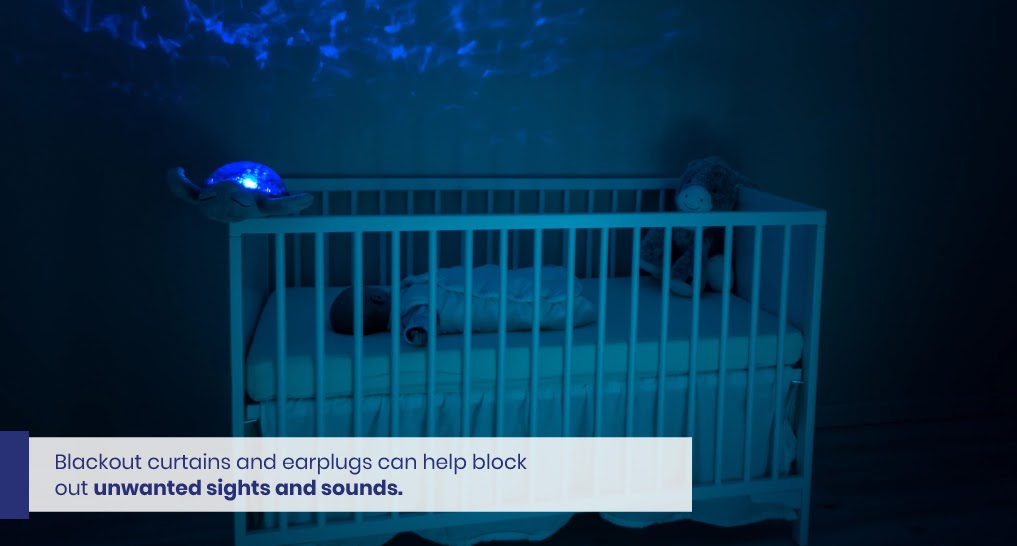
People with Autism Spectrum Disorder are extremely sensitive to their environment, especially loud noise and light. You can keep the room dark and soundless to ensure fewer disturbances.
Thick, blackout curtains can block out light and mask sounds. Sounds can be difficult to block but many parents use earplugs, white noise machines or calming music to block outside noises.
Help Them Feel Calm and Secure
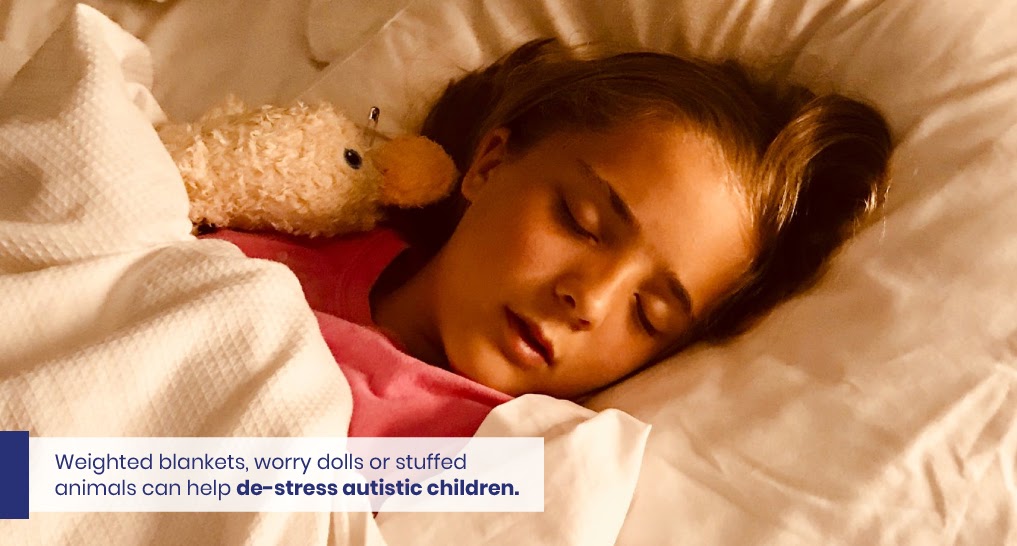
Remove toys and TV to make the room ecologically comfortable for your autistic child. Make the bedroom secure by adding a night lamp or light vanilla candles to calm the nerves. Some kids feel safe if their mother’s PJs with their unique perfume is in the room where they sleep.
When you choose your child’s mattress, sheets, pillows or blankets, visit a mattress showroom with your child to see which material agrees with them. Weighted blankets, worry dolls, or stuffed animals are quite effective in de-stressing autistic children.
Establish a Sleep Ritual

Always set a list of activities for your autistic child that they must do prior to sleep time. The purpose of this bedtime routine is to help them unwind and calm the mind for some shut-eye.
These activities may include a warm bath, putting on PJs, brushing their teeth, taking their favorite toy to bed, reading a story, and shutting off the light. By repeating this chain of events daily will help develop a sleep onset time for your autistic child.
Gradually, it will train their body and mind and set a consistent rhythm for their sleep-wake cycle. Use visual aids, pictures, sleep charts or written cues to help your child understand what they need to do and why.
Revise this sleep regime often to see what works and what does not as your child’s sleep improves.
Stick to Regular Bedtime and Wake up Time

Be consistent with your sleep time. Make sure that your autistic child goes to bed and wakes up at the same time each night, even on weekends. It will help normalize the child’s circadian rhythm and the sleep-wake cycle.
Always make sure to give them a predictable transition from waking to sleeping and vice versa. Sudden changes can easily terrify children with ASD. You can alert them at least 15 minutes before time for their bedtime rituals.
You can also use visual cues or set auditory alarms to signal them about their approaching bedtime. This can also ease their transition to sleeping independently.
Avoid Stimulants Before Bed

Avoid all caffeinated drinks or sugary foods at least four hours before bedtime. If your child suffers from constipation, avoid foods that can cause bloating or discomfort. A healthy gut improves sleep and other behavioral symptoms in children with autism spectrum.
Another thing to avoid is blue-light exposure prior to sleep. Turn off the TV and other gadgets with brightly-lit screens an hour before going to bed.
Don’t let them engage in intense activities and gently steer them to their sleep ritual. You can do a gentle massage or put pressure on their body to help them settle down.
Do Plenty of Exercises During the Day
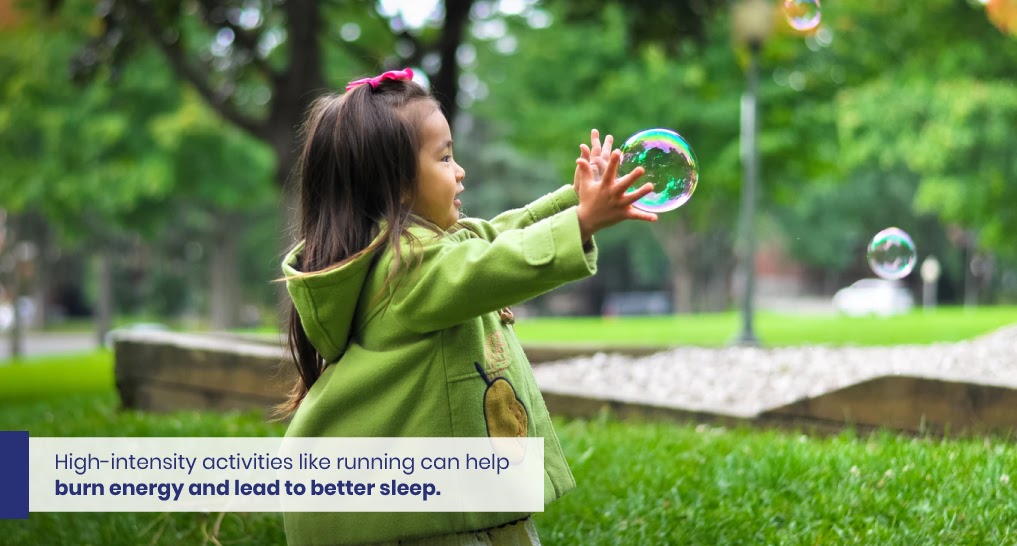
Autistic children typically have high energy levels; they are mostly restless and hyperactive. Engage them in high-intensity activities and exercise during the day to run as much energy off as you can.
You can also cut down their daytime nap to build sleep pressure for the night. Even a short nap during the day can give them a second wind and delay sleep onset at night.
Consult Your Pediatrician

It’s a good idea to consult your child’s pediatrician regarding any sleep issues. Keep a sleep diary to identify your child’s sleep routine, which prevents them from falling asleep, and what helps. This way your child’s doctor will be in a better position to guide you.
If your child has sleep apnea, getting proper treatment can improve sleep significantly. The doctor can advise various therapies and early intervention services if required. They often have information about respite care for parents of children with ASD or other support groups.
Would Better Sleep Help Improve Symptoms of Autism?

According to Angela Maxwell-Horn, a pediatrician and professor at Vanderbilt University in Nashville, “better sleep can’t cure autism.” However, most of the research shows a direct relationship between the severity of sleep issues and behavioral ASD symptoms such as cognition, social skills, and irritability.
In a child who underwent surgery to treat sleep apnea improved her ability to socialize immensely. Her attention span increased and the repetitive behavior reduced. Similar improvements were observed among autistic individuals who took melatonin for poor sleep.
Resources for Parents
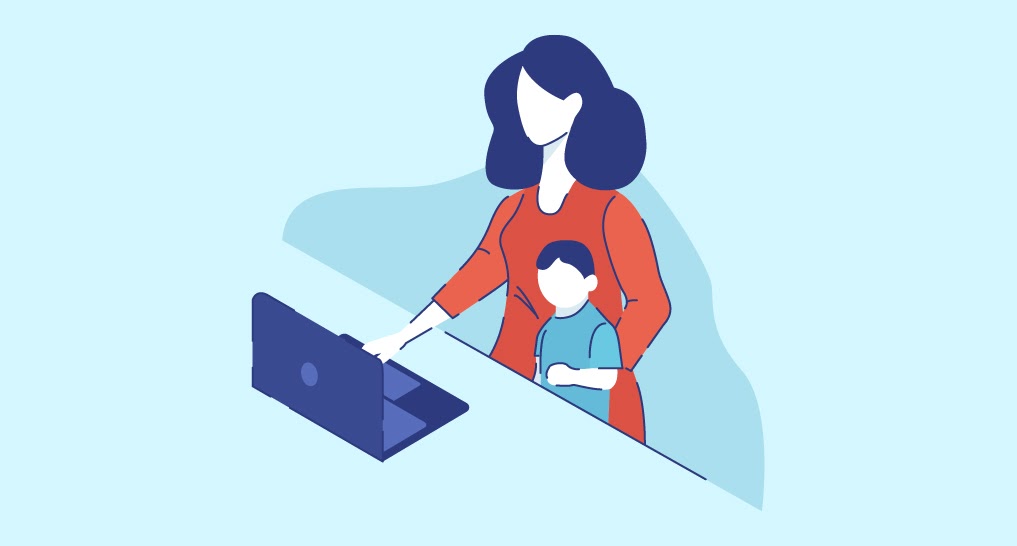
There is no single treatment to solve sleep problems in children with autism spectrum. But you can try different methods to find the one that best suits your child. This may require time, effort and patience but will ensure better sleep for your child.
Here are a few resources if you wish to know more about autism, its causes, treatments, and ways you can improve your quality of life.
- Cognitive Behavioral Therapy for Children with Autism and Sleep Disorders
- Can Medication Help With Your Child's Autism?
- Parenting a Child With Autism
- Autism: Symptoms, Signs, Causes & Treatment
- What the Research Says: Do Weighted Blankets Work?
Autistic children can be very intelligent with high IQ levels but low intellectual abilities. When in distress, they throw tantrums, make noises or show signs of irritability and anger. Along with medical care, they need attention, love, and acceptability from the people around them.
Sleep plays an important role in the well-being of children with ASD. Although much research is still needed, you still have a lot of options including medications, CBT, and various other techniques to help your autistic child develop healthy sleep habits.

 Free delivery across US & Canada
Free delivery across US & Canada Best price guarantee
Best price guarantee Extended 120-day sleep trial
Extended 120-day sleep trial Free in-store mattress testing
Free in-store mattress testing

![Insomnia [Illustrated icon] Sleep Disruptions [Illustrated icon] REM Sleep Latency [Illustrated icon] Sleep Apnea [Illustrated icon]](https://www.sleepare.com/wp-content/uploads/2020/03/Autism-and-Sleep-3.jpg)

![Melatonin Supplements [Illustrated icon] Cognitive-Behavioral Therapy [Illustrated icon] Light Therapy [Illustrated icon] Relaxation Techniques [Illustrated icon]](https://www.sleepare.com/wp-content/uploads/2020/03/Autism-and-Sleep-5.jpg)



![Keep the Bedroom Cool, Dark and Quiet [Illustrated icon] Help Them Feel Calm and Secure [Illustrated icon] Establish a Sleep Ritual [Illustrated icon] Stick to Regular Bed and Wake Time [Illustrated icon] Avoid Stimulants Before Bed [Illustrated icon] Exercise During the Day [Illustrated icon] Consult Your Pediatrician [Illustrated icon]](https://www.sleepare.com/wp-content/uploads/2020/03/Autism-and-Sleep-9.jpg)










 Showrooms
Showrooms

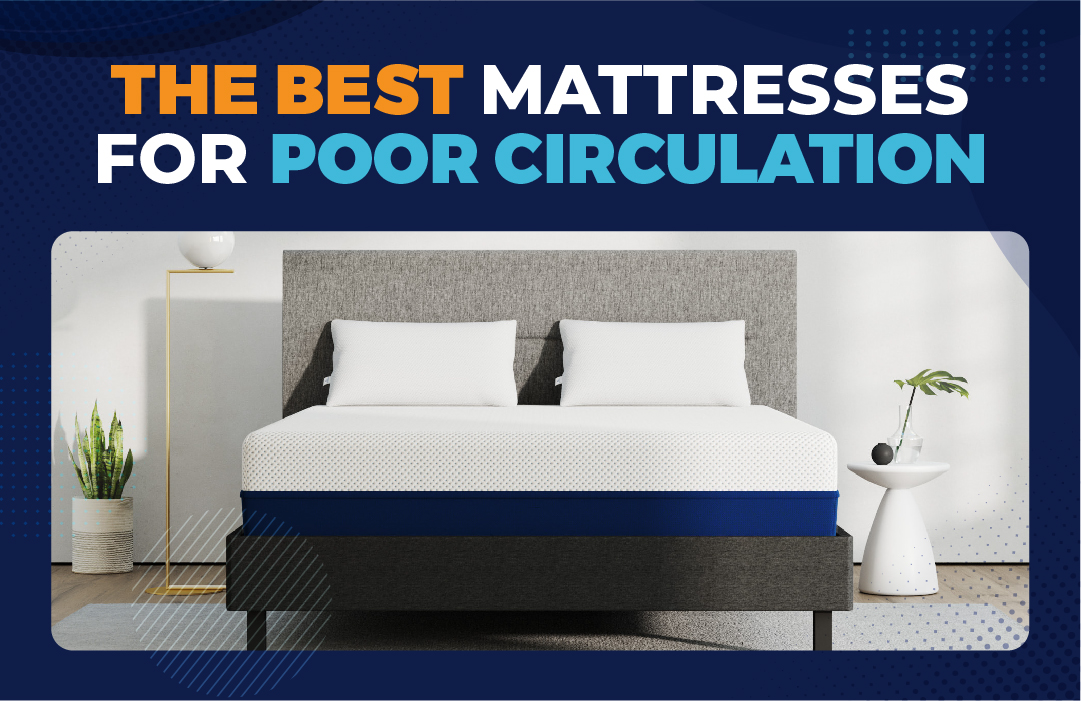



Meet The Author:
Shanir Kol
Shanir Kol, founder and CEO of SleePare, pioneered the “Try and Buy” model in eCommerce, enhancing mattress shopping by combining in-store trials with online purchases. Launching in 1999, his company focuses on customer satisfaction and eco-friendly practices, aiming to minimize mattress waste and expand sustainably.